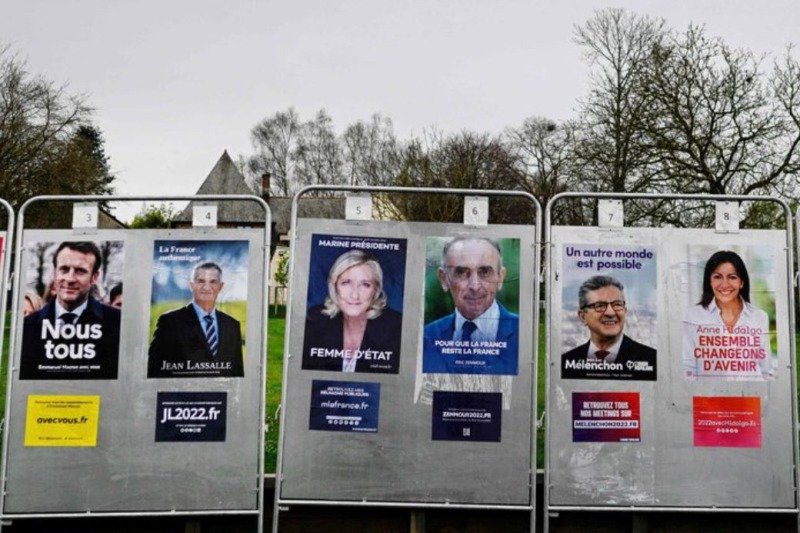Philadelphia Eagles training camp hints at problem only trade might

France-Présidentielle: Sunday’s election explained simply

Tomorrow Sunday is the first round of the presidential election in France. They are all 12 candidates to seek to occupy the Elysée but only 3 of them have a real chance of winning. Here is a presentation of the candidates for the first round of the presidential election scheduled for this Sunday.
The French must vote this Sunday, April 10 for the candidate they wish to see at the Elysée for the next five-year term, the transition of which is scheduled for May 13.
The outgoing President of the Republic Emmanuel Macron, the youngest Head of State in France is a candidate for re-election for a second term.
The election should take place in two rounds, the first between 12 candidates from all political stripes. It will release two candidates to advance to the second round, scheduled for April 24. But if one of the candidates obtains the absolute majority of 50% +1, he will automatically be elected president, without going through the second round.
Who are the candidates?
Of the dozen candidates, 6 stand out; Outgoing President Emmanuel Macron, Jean-Luc Mélenchon, Marine Le Pen, Valérie Pécresse, Eric Zemmour and Yannick Jadot.
Of these 6 candidates, 3 are from the right and 2 from the left, and 1 centrist. Right-wing candidates are the most represented, with Valérie Pécresse for the Republicans representing the traditional right.
Opposite her are Marine Le Pen and Eric Zemmour who represent the hard wing of the right, the extreme right, racist and ultra-nationalist.
Regarding the left, which held the presidential office before Emmanuel Macron with François Hollande, it is paying the price for its lack of unity and its division. The Socialist Party does not have a known and clear leader to represent it and the candidates have not sought to create a left front to support a strong candidacy which would have made it possible to reshuffle the cards of the political chessboard.
Thus, we find Yannick Jadot who represents Les Verts and Jean-Luc Mélenchon who represents the radical left with La France Insoumise and he is one of the strong candidates of this first round.
For his part, Emmanuel Macron is considered a centrist candidate since he brings together ideas from the left and the right as well. He can boast of a very positive economic record for France, which is one of the central subjects of this presidential election.
Topics Discussed: Differences Between Candidates
The main topics discussed during the election campaign were also immigration, security and the crisis between Ukraine and Russia. The candidate Jean-Luc Mélenchon has the most advanced program and the most likely to please the French on the economic file.
Immigration was the main subject of the far right represented by Eric Zemmour and Marine Le Pen who said they were committed to turning back immigrants to Morocco, Algeria and Tunisia, 100,000 people a year for Eric Zemmour for example , and to remove the jus soli, the withdrawal of dual nationality if the second nationality is extra-European for Marine Le Pen…
Their migration policy essentially targets Africans with a focus on North Africa, as well as a discriminatory discourse that particularly targets Muslims.
Jean-Luc Mélenchon strongly denounces this policy, while Emmanuel Macron proposes better adjustments to the current immigration policy, such as conditioning the granting of long residence permits on a French exam and the observation of “real efforts of professional integration”.
On the crisis in Ukraine, President Emmanuel Macron distinguished himself by his diplomacy aimed at lowering the tension between the two countries by increasing telephone exchanges with the two parties. For their part, the candidates of the right have discredited themselves in the face of their support for Russia.
Who are the favourites?
According to polls of voting intentions, it is outgoing President Emmanuel Macron who has the best chance of winning this election. He has been declared a favorite for several months even before he announced his candidacy. He is considered the candidate of reason.
However, he does not gather a strong national consensus and has little chance of winning the presidential election in a single round against a far-right discourse that has seduced a good part of France since the emergence of even more radical ideas. at the polemicist Eric Zemmour who made Marine Le Pen seem more “soft” in appearance even while having exactly the same speech.
They are twelve to run for the French presidency, promised according to all the polls to Emmanuel Macron, but the two main rivals seem to be Marine Le Pen and Jean-Luc Mélenchon.
According to the latest Ipsos polls, updated Thursday, Emmanuel Macron remains in the lead in voting intentions with 26.5%, followed by Marine Le Pen with 23% and Jean-Luc Mélenchon with 16.5%. The 6 other candidates not mentioned in this article each have less than 4% voting intentions.
.
